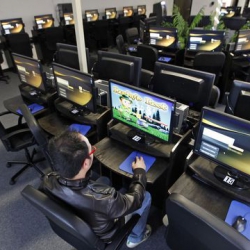
Internet Sweepstakes Cafes Have Made News in Indiana, North Carolina, and Illinois
The California Supreme Court ruled against Internet sweepstakes cafes on Thursday, ruling the games housed in their businesses are illegal. The decision is a blow for a type of gaming which has swept the nation in the past 10 years. During that time, over 20 US states have enacted laws to ban such gaming. California was seen as a key battleground, because of its large population.
When a person enters a sweepstakes cafe, they buy time on a computer equipped with gaming software. The games played on the sweepstakes machines have the look and feel of slot machines. Proprietors said the games were not slots, because they used sweepstakes game mechanics like the Publishers Clearinghouse and other such sweepstakes contests.
Considered to be Slot Machines
The California Supreme Court decided in a unanimous decision that the sweepstakes cafes are another form of casino-style slot machines. Such gaming machines are outlawed in California.
For the last several years, the Internet sweepstakes cafes were a growing trend in California. The businesses are often hard to distinguish from traditional Internet cafes, which might serve coffee or soft drinks to visitors who need to use the place’s Internet access. Sweepstakes cafes often are found in strip malls and shopping centers, amidst conventional businesses.
Tribal Casinos Wanted Them Gone
The Internet gaming cafes had become a key issue to California’s tribal casino interests, because they provided casino-style gambling in local communities throughout the state. On January 1, 2015, a law went into effect which effectively banned such cafes in California.
Since January 1, many of the businesses had closed voluntarily. Others were closed by police in the local communities, seeking to enforce the ban. Still others continued to operate, because of how easily they are concealed.
28-Page Legal Opinion
Justice Ming W. Chin wrote a 28-page opinion on the case, which sums up the thoughts of the seven justices. Justice Chin wrote, that when a person “plays a game to learn the outcome, which is governed by chance”, then “the user is playing a slot machine.”
He described the software used to support such gaming, then wrote such games seek “to recreate the sensation of playing with a device that itself generates the chance element.”
The justices wanted to discuss the legal mechanism used to skirt the laws, which is the money used to buy “for Internet access”. Operators say gamblers buy time on the computers, not entry fees into a sweepstakes. Opponents of sweepstakes cafes say that is a technicality used to avoid the ban on slot machines.
“Clearly Paying…[to] Win Cash Prizes”
Justice Chin said that people who buy time on one of the sweepstakes computers is “clearly paying…it appears, in large part, for the opportunity to play the casino-style sweepstakes games and win cash prizes.”
The justices concluded that, “The Legislature could not have intended and, more importantly, [the] (state law’s) language does not permit the conclusion that a business in California may lawfully operate traditional Las Vegas-style slot machines–with spinning wheels and everything else one associates with slot machines–merely by inserting into them software created elsewhere that presets the results.”
January 1 Law Not Cited
California’s high court did not cite the January 1 law, but instead consolidated several prior cases The appeal which came to the Supreme Court was a 2012 case in which Kern County prosecutors sought to shut down gaming machines at 5 Internet sweepstakes cafes in Bakersfield. The 5th Circuit Court of Appeals upheld the Kern County ban previously, but that decision was referred to the high court.
Related Case in Granite Bay
In a related case, Don Freels, a 44-year-old men resident of Granite Bay, is set to have a sentencing hearing soon before US District Court Judge Morrison B. England Jr. on June 30. Don Freels was the owner of Minden-based Capital Sweepstakes Systems Inc. and Capital Bingo Solutions Inc., which provided software to one of the operators in the Kerns County case.
Mr. Freels is accused of organizing illegal gambling, due to his activities with Capital Bingo. Capital Bingo supplied the gaming software to John Stidman, the owner of the I Zone Internet Cafe. The maximum federal fine for illegal gambling is $500,000. The maximum fine for the same activity under California state law is $1,000. Don Freels has pleaded guilty to the charges, though the judge in the case wanted to wait for the California Supreme Court decision before handing down a sentence.
